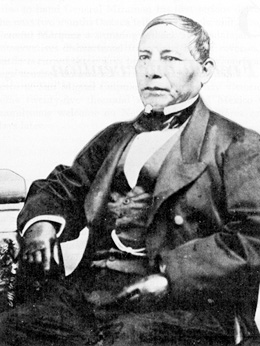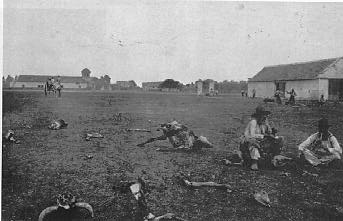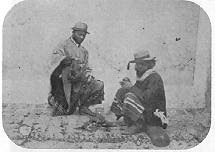Week 5—History of Latin America
Nation-Building in the 19th Century
*************************************************************
Liberals and Conservatives
I. The Liberal Resurgence, 1850-1880
A. Domingo Faustino Sarmiento (Argentina, 1864-70)
- 1845, The Life of Facundo, or Civilization and Barbarism
- Indian wars
- "gobernar es poblar"
- education
B. Benito Juárez (Mexico, 1861-64, 1867-72)
- Zapotec from Oaxaca
- La Reforma
- Maximilian (1862-65)

II. Mid-19c War and Nation-building
A. War of Triple Alliance, 1865-1870 (Paraguay, Uruguay, Brazil, Argentina)
- Brazil
Free Birth Law (1871)
Abolition (1888)
Brazilian Republic (1889)
- Argentina
Julio Roca (1880)
B. War of the Pacific, 1879-1884 (Bolivia, Peru, Chile)
III. Positivists and Progress, 1880-1930
- Auguste Comte
- Social Darwinism
- immigration: 2.5 million
- modernization
- Order and Progress
IV. Neocolonialism
A. British (Malvinas islands 1833, 1982) and U.S.
B. Economic aspects
- Mexico: 900 % exports growth 1877-1910
- Brazil: 2/3 world supply of coffee
- Amazonia: rubber
- Cuba: 5 million tons by 1929
- Chile and Peru: nitrates, copper, iron
- Argentina: 1000x more wheat in 1900 as 1876!!
- Bolivia: tin
- Ecuador: cacao
- Central America, Colombia: bananas & coffee
- Venezuela: oil
C. Political aspects
- foreign influence, ie Bolivia, tin, & Simón Patiño's superestado minero
- authoritarian rule + patronage
D. Social aspects
- emulation of Europe
Gabriel García Marquez's Colombia
I. One Hundred Years's Colombian and LA Context
- La Violencia, 1940s & ‘50s
- Cuban Revolution, 1959
II. Regionalism and Isolation
- Geography: cordilleras, llanos, Amazonia , East/West
- Low population density
- Isolation between regions
III. Liberals vs. Conservatives in Colombian history
- Class interests
- The church
- 1899-1902, War of a Thousand Days; Treaty of Neerlandia, Gen. Rafael Uríbe Uríbe
IV. Economic Patterns, 1850-1930
- 1900-1925, “Dance of the millions”
- Coffee; small vs. large producers, Federation of Coffee Growers (1927)
- Bananas; Macondo = Bantu word Makondo (bananas); United Fruit Company (1920s in Magdalena region); Ciénaga, Dec. 1928 massacre


